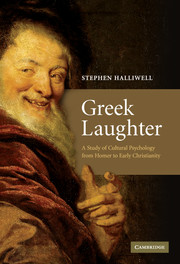Book contents
- Frontmatter
- Contents
- Preface
- Note to the reader
- Abbreviations
- 1 Introduction: Greek laughter in theory and practice
- 2 Inside and outside morality: the laughter of Homeric gods and men
- 3 Sympotic elation and resistance to death
- 4 Ritual laughter and the renewal of life
- 5 Aischrology, shame and Old Comedy
- 6 Greek philosophy and the ethics of ridicule
- 7 Greek laughter and the problem of the absurd
- 8 The intermittencies of laughter in Menander's social world
- 9 Lucian and the laughter of life and death
- 10 Laughter denied, laughter deferred: the antigelastic tendencies of early Christianity
- Appendix 1 The Greek (body) language of laughter and smiles
- Appendix 2 Gelastic faces in visual art
- Bibliography
- Index of selected authors and works
- Index of selected Greek terms
- General index
8 - The intermittencies of laughter in Menander's social world
Published online by Cambridge University Press: 22 September 2009
- Frontmatter
- Contents
- Preface
- Note to the reader
- Abbreviations
- 1 Introduction: Greek laughter in theory and practice
- 2 Inside and outside morality: the laughter of Homeric gods and men
- 3 Sympotic elation and resistance to death
- 4 Ritual laughter and the renewal of life
- 5 Aischrology, shame and Old Comedy
- 6 Greek philosophy and the ethics of ridicule
- 7 Greek laughter and the problem of the absurd
- 8 The intermittencies of laughter in Menander's social world
- 9 Lucian and the laughter of life and death
- 10 Laughter denied, laughter deferred: the antigelastic tendencies of early Christianity
- Appendix 1 The Greek (body) language of laughter and smiles
- Appendix 2 Gelastic faces in visual art
- Bibliography
- Index of selected authors and works
- Index of selected Greek terms
- General index
Summary
What if everything in the world were a misunderstanding, what if laughter were really tears?
Kierkegaard, Either/OrTHE CONFUSIONS OF LAUGHTER AND TEARS
Early in Act Ⅲ of Menander's Dis Exapaton, the young Athenian Sostratus, recently returned from a trip to Ephesus during which he had fallen in love with the hetaira Bacchis (of Samos), comes unexpectedly face to face with his friend Moschus. While still in Ephesus, Sostratus had sent a letter to Moschus asking him to track down Bacchis after she had been brought to Athens by a rival lover; but at this stage he wrongly believes his friend betrayed him by starting an affair of his own with her. Moschus, who has in fact fallen for Bacchis' twin sister (also called Bacchis) and has no reason not to anticipate a happy reunion with his friend, realises as soon as he sets eyes on Sostratus that something is amiss. What confronts him is the reverse of the laughter or smiles that should be normal in such an encounter: Sostratus strikes him as being on the verge of tears. He asks immediately for an explanation:
τί κατηφὴς καὶ σκυθρωπός, εἰπέ μοι;
καὶ βλέμμα τοῦθ´ ὑπόδακρυ;
Why are you so downcast and sullen, tell me?
And what's this tearful look about?
The fragmentary papyrus text breaks off soon after this, just as the misunderstanding between the two young men is on the point of being cleared up.
- Type
- Chapter
- Information
- Greek LaughterA Study of Cultural Psychology from Homer to Early Christianity, pp. 388 - 428Publisher: Cambridge University PressPrint publication year: 2008



